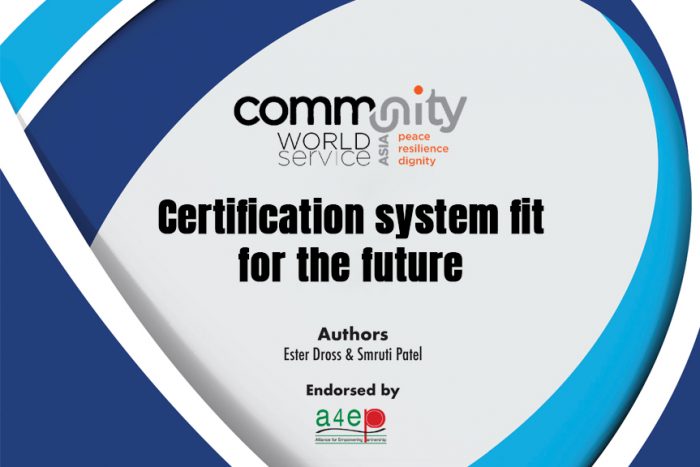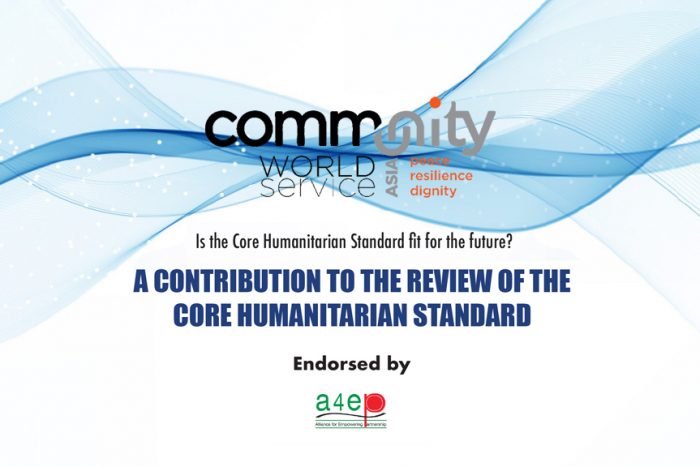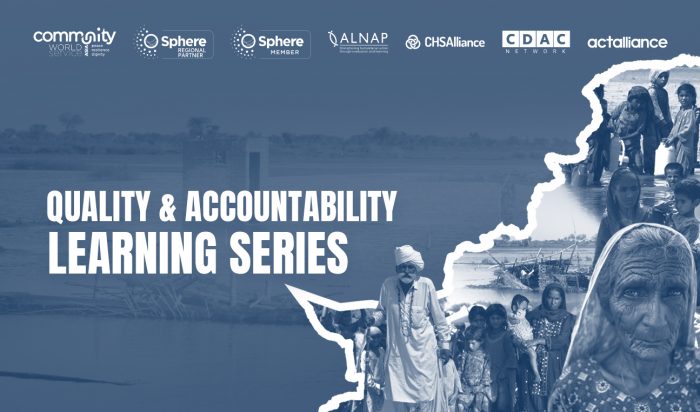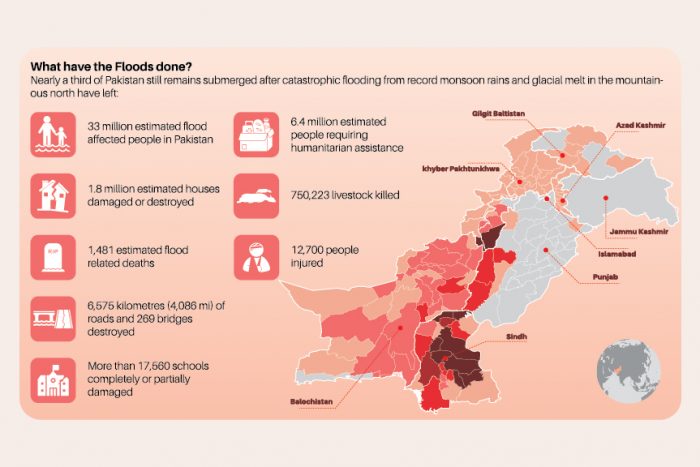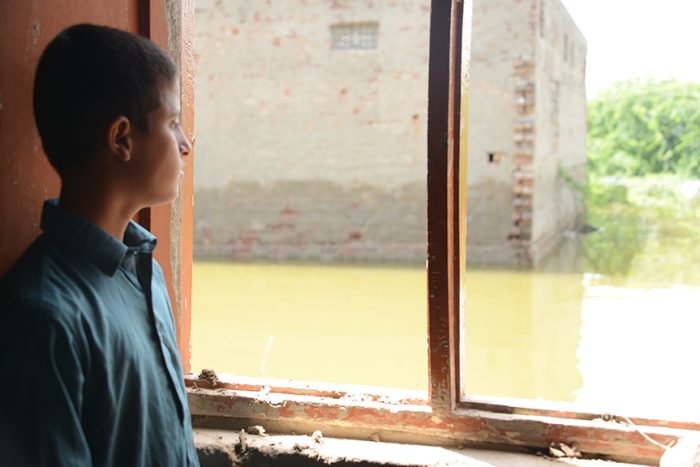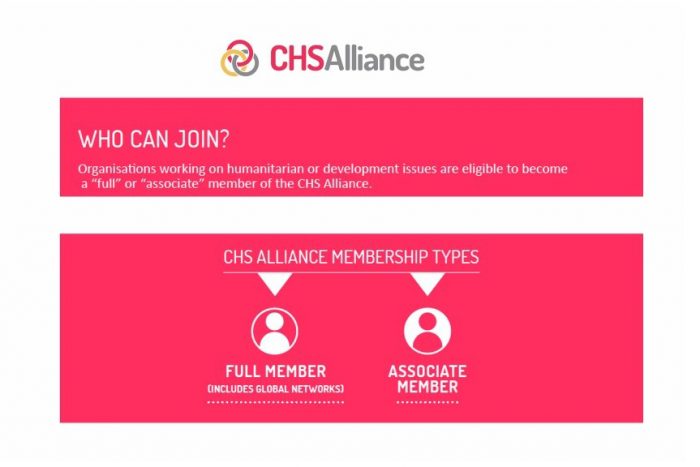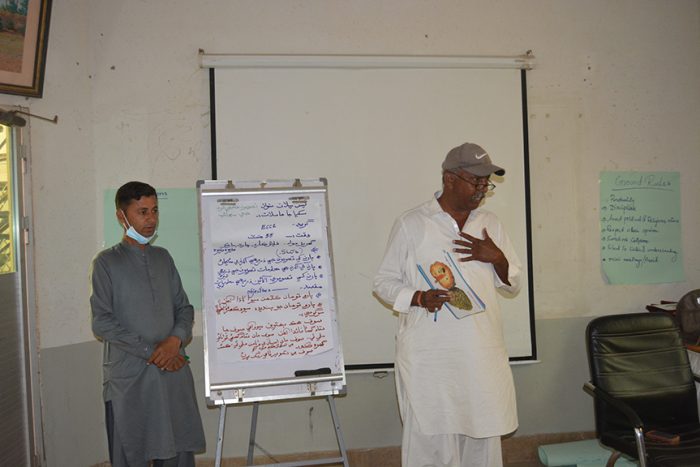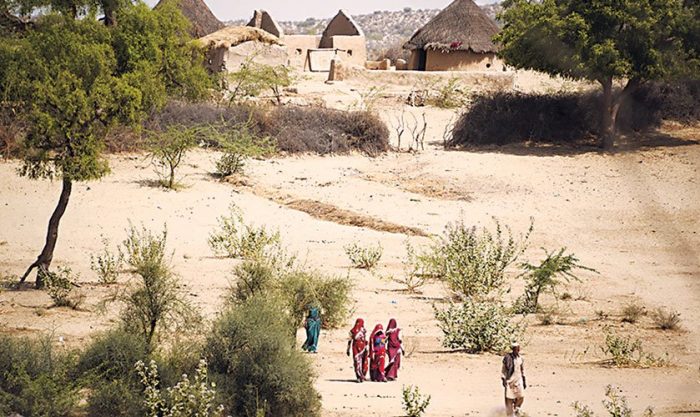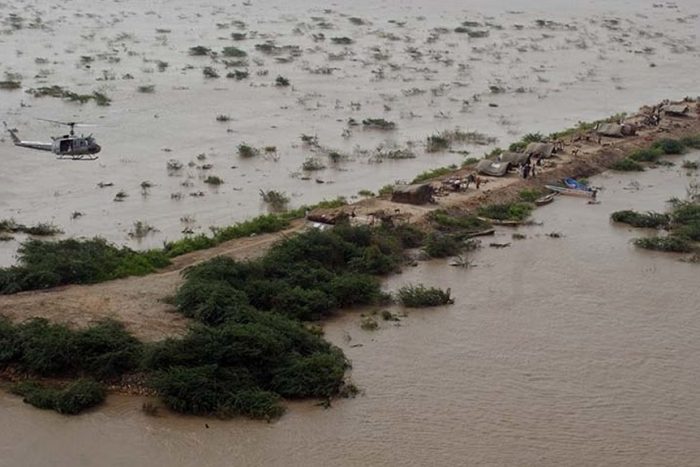This discussion paper has been developed to assist in exploring different options and contribute to making the humanitarian certification process fit for the future. It sets out some of the challenges from the lessons learned from the existing standard and certification process and suggests options for alternative processes for consideration for the future. It is hoped that the paper will be used to explore some more realistic options that will ensure wider reach and more inclusion of local and national actors in the Global South.
comms
A contribution to the review of the core humanitarian standard
The Core Humanitarian Standard on Quality and Accountability (CHS) emerged in 2014 from an extensive consultation process. It contains excellent guidance, further detailed in its 2015 Guidance Notes and Indicators. The Standard is currently under revision. This note seeks to contribute to that revision. The first section recommends greater nuance in some of Standard’s guidance. The second section requests that the CHS, in its application and verification, is squarely put within the political economy of aid, notably of the relief sector. The third section requests that the CHS Alliance ensures that its Standard is not misused to reinforce the structural inequalities in the sector.
Session 2: What Does It Take to be Good Enough: Quality, Accountability and Safeguarding in Pakistan Flood Response
Where: Zoom (register here)
Date: 19th September 2022
Time: 12.00 pm to 01.00 pm (Pakistan Standard Time)
Language: English
Objectives
By the end of the session participants will be able to:
- Understand the Do No Harm and People-Centred Approaches in the current context
- Discern how the Humanitarian Charter, Code of Conduct and an effective Complaint Response Mechanism can play a role in ensuring accountability of aid
- Learn how to place people and communities at the centre of their work throughout the program duration
Background
The catastrophic flooding in Pakistan’s southern and northern regions has killed thousands of people and carried away cattle, houses, and treasures worth billions of rupees, for which long-term assistance is anticipated by the humanitarian sector. Several local non-governmental organisations (NGOs) are engaged in emergency flood relief.
Delivering aid through the current emergency reflects our humanitarian values and principles. However, in some cases there may be unintended negative consequences. These have to be considered from upfront and minimized in case they would harm the people we intend to serve.
Community World Service Asia is launching a Q&A learning series for NGOs currently engaged in flood response in the country to ensure that quality and accountability aspect is covered through humanitarian relief activities. Participating organizations and their staff will be able to learn from each other and improve humanitarian coordination to effectively respond to the people affected by the crisis and align the support to their needs.
Sylvie Robert Speaker

Sylvie Robert is an adult learning expert with over 25 years’ experience in the humanitarian sector, passionate about and dedicated to Quality, Accountability to Affected Populations (AAP) and Prevention of/ Protection from and Response to Sexual Exploitation and Abuse (PSEA). She works primarily with field practitioners to identify lessons from the implementation, learn from those and stimulate change, specifically in complex environments.
Community World Service Asia is the regional partner and country focal point of Sphere and member of CHS Alliance for promoting quality and accountability (Q&A) standards, tool and principles.
Pakistan Floods 2022 A third of Pakistan still underwater
Half-cooked meals and no one to play with
Thirteen-year-old Luqman looks outside his window, their house surrounded by up to 10 feet of contaminated water at all sides. Luqman is the only boy in a house full of women in a far corner of a deserted village deep in flood water. The only way to access the house is in a boat that costs PKR 50 for one person, one way, from the main road. He must take care of his mother, his younger siblings, his aunts and grandmother who have been asked to stay in their flood-hit house to safeguard the honour of their Baloch family. The older men of the house have evacuated to safer grounds and in make-shift shelters on the canal banks and roadside in search of relief and in-kind assistance.
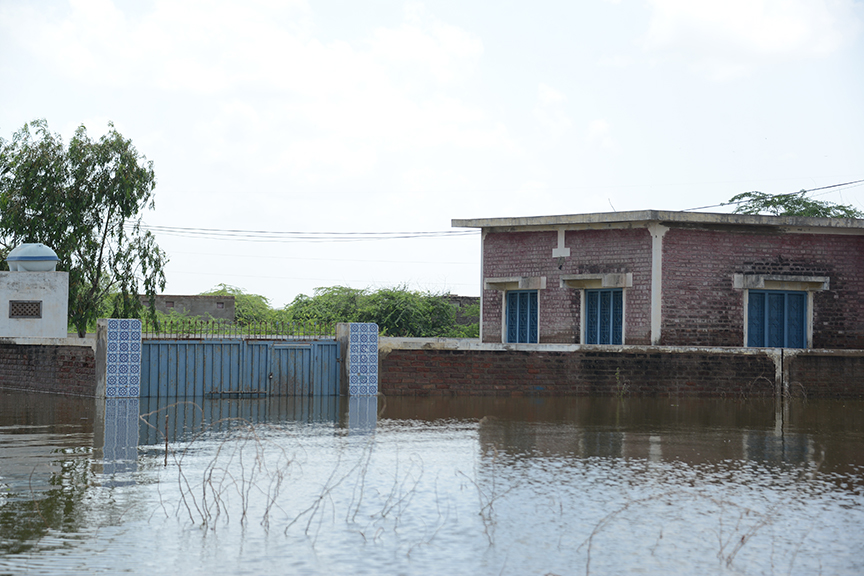
Luqman was a regular student at the Public Boys Schools in their neighbourhood in village Sayandad Alyari of Jhudo district, Sindh. He was studying in Grade 6 and was very proud of his academic accomplishments so far. Excitedly, he took out his last report card and showed it to us with gleaming eyes. Since monsoon rains hit Jhudo district in early June, the public school in their village has been shut down for two months now.
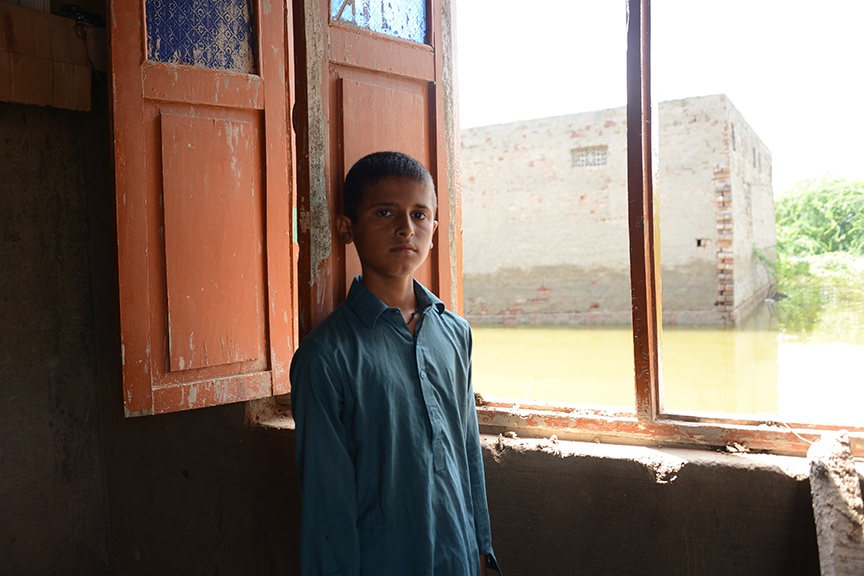
Missing his school days, his friends and even the homework he got, Luqman is growing more and more tired and frustrated in his house. He has no one to play with. All of his friends and relatives from the village have evacuated to the roadside while he is stuck in the water-guarded house. His mother and grandmother do not allow him to wander off outside the premises due to a growing number of snakes in the water around and a high probability of skin infections caused mainly from water contamination. Many children and people from their village are falling sick and catching skin infections.
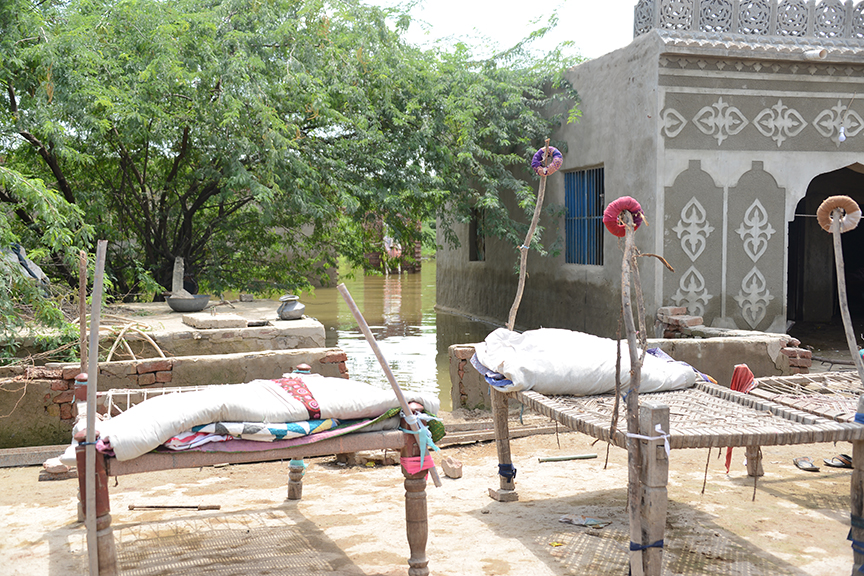
Every day, Luqman hopes that somehow miraculously the water level around their house and in their village would go down and things would get back to normal. He wished to have a hot, scrumptious meal – with fresh roti and fully cooked, delicious curry or vegetables. He was only eating half-cooked meals which did not taste that great these days. The water that they use in cooking is dirty and they do not have enough fuel or fire wood to prepare meals properly. This is the reality that Luqman and many other flood-affected children are surviving on a day to day basis.
Sphere focal points in Asia take up key role in CHS revision process – ensuring it is made more Relevant and Accessible
The Sphere Focal Points group in Asia has started following a regular quarterly model of virtual meeting to adjust to post-pandemic realities and make information sharing more timely and consistent. These meetings ensure to engage all focal points and sets ground for better communication and learning while highlighting and discussing contextualised challenges in different countries, and how to overcome them.
Held in June, this year’s second virtual meeting focused on sharing information about the Core Humanitarian Standard, which is one of the foundation chapters of Sphere. The CHS Alliance Strategy 2022-2025 and its Revision process was also discussed in this session. Shama Mall, Deputy Regional Director at CWSA, shared an overview of how Sphere Strategy and the newly launched CHS Alliance Strategy complement each other.

“The Core Humanitarian Standard was based on a large consultation which lasted 12 months with communities and people affected by crisis, NGOs and networks, governments, UN agencies, academics, and funding partners and overseen by a Technical Advisory Group. As a measurable and verifiable standard, CHS verification which is valid for two years and is managed by the CHS Alliance is ‘a structured’, systematic process to assess the degree to which an organisation’s work complies with the CHS,” shared Bonaventure Sokpoh from CHS Alliance who also participated in this virtual session.
While discussing the recently launched CHS revision process and consultations, Aninia Nadig, CHS Revision Manager, presented a detailed purpose and plan “The CHS is one of the foundations for technical standards and other initiatives. It serves as a framework for monitoring and continuous improvement while influencing the system-wide policy and operational challenges as well as transforming relationships with people and communities, making aid more effective and accountable. The CHS Revision process has been officially launched in May this year in light of global and local changes and it aims to look into the aspects of CHS working well, those need to be changed and how its potential can be maximised to make sure that the CHS is more accessible and relevant to all stakeholders. The revision scope focuses on three levels: structure, content and use.”
“For CHS Revision to be effective, a global consultative process grounded in local realities is required. A successful CHS revision would result in the standard being more accessible and inclusive, relevant for today and future challenges, better known and used by many more stakeholders, driving continuous, measurable improvements, and increasing accountability at all levels,” said Aninia.
To take the CHS Revision Consultations to scale, it is necessary to explore the role that organisations and networks in member countries can take to ensure participation of all relevant stakeholders in the consultations. Guidance for the consultations, including tools, have been launched and available to all members and the humanitarian community at large. Aninia Nadig emphasised that since CHS is a part of the Sphere handbook, Focal Points promoting Sphere can support the revision process by conducting consultations in their respective countries as well.
CWSA’s consultation plan for this year was shared with all focal points to share a reference regarding implementation. The diverse voices from affected communities and organisations will help make the revised version more effective and relevant.
Creating nurturing and safe learning environment for children in rural Sindh
Fifty year old Pehlaj works as a primary school teacher at a government school in Umerkot district of Pakistan. His co-education school is located in a remote part of Umerkot, with a student count of 262, and a total of five teachers.
As part of a training programⁱ for teachers, Pehlaj participated in three trainings focused on Early Childhood Care and Education (ECCE). The trainings aimed to increase teachers’ capacity on teaching in a pandemic environment, child-centrered and positive learning techniques. “This was a first of its kind experience for me. I became more acquainted with early-grade teaching techniques owing to the training, which also included classroom management, learning corners and class decorations. Additionally, the session on COVID-19 pandemic taught us practical steps to follow in schools to stop the virus from spreading among students and teaching staff,” shared Pehlaj.
Like other participants of the trainings, Pehlaj received an ECCE kit at the end of the training, which included stationary, poster cards, water colours, markers, wall clock, puzzles, play cards, learning cards of English and Urdu Alphabets, colour pencils and chart papers. “The learning kit was a good motivation and helped us make our lessons very interesting. Our students enjoyed learning through practical activities. I came up with a plan to develop identical kits for other classes at the school too.”
As a hobby and passion, Pehlaj also sings songs and performs as a professional dancer at religious activities for which he is paid mostly. Pehlaj turned down payments in the past and only recently has started accepting payment for his performing art services. “I began to accept PKR 5000 as remuneration for each performance at the festivals. I buy first aid kits, educational materials, stationery, and play cards for the students in Grades 1 to 5 with the additional money I make.”
The hygiene kits provided in the trainings focused on education during a pandemic, particularly COVID-19, have been quite useful, conferred Pehlaj. “I encouraged the students to use face masks and hand sanitizers in the classroom and made them wash hands with soap before and after lunch breaks. Additionally, we ensured phenyl was used to disinfect classrooms.” Pehlaj also oriented other students and teachers on COVID-19 SoPs through individual sessions in each classroom of their school.
A hand washing station was also installed in the school under the project. Students were oriented on effective hand-washing to prevent coronavirus.
“Students in remote schools have less resources to pursue a high standard of education and combat pandemics. This assistance was both necessary and timely. Our students are actively participating in their education activities and utilising classroom resources effectively,” concluded Pehlaj.
ⁱ Community World Service Asia & Act for Peace’s Education project
Session 1: Using Core Humanitarian Standard in Pakistan Flood Response 2022
Where: Zoom (register here)
Date: 9th September 2022
Time: 10.00 am to 11.30 am (Pakistan Standard Time)
Background
The catastrophic flooding in Pakistan’s southern and northern regions has killed thousands of people and carried away cattle, houses, and treasures worth billions of rupees, for which long-term assistance is anticipated by the humanitarian sector. Several local non-governmental organisations (NGOs) are engaged in emergency flood relief. Experiences and lessons from emergencies such as earthquakes and floods in Pakistan, Myanmar, Haiti and Kenya have shown that effective coordination and mutual learning among agencies enhances the quality and accountability of humanitarian action to people affected by crisis.
Community World Service Asia is the regional partner and country focal point of Sphere and member of CHS Alliance for promoting quality and accountability (Q&A) standards, tool and principles. Community World Service Asia is launching a Q&A learning series for NGOs currently engaged in flood response in the country to ensure that quality and accountability aspect is covered through humanitarian relief activities. This forum will also provide a platform for sharing experiences, best practices and challenges for ensuring quality and accountability in the flood response. Participating organizations and their staff will be able to learn from each other and improve humanitarian coordination to effectively respond to the people affected by the crisis and align the support to their needs.
Objectives
By the end of the session participants will be able to:
- Introduce the CHS guidance in response to floods
- Revisit fundamental principles of CHS which are crucial to a successful, holistic intervention
- Explore the relevant commitments & guidance in CHS
- Elicit examples and challenges from participants to promote further learning
Moderator
Tooba Siddiqi is an experienced Engagement Manager with over 10 years of experience in partnership management, advocacy, youth mobilization and community-led campaigning. In her time at Community World Service Asia, she has played a significant role in pushing the Quality and Accountability standards with local NGOs as well as regional organisations. She is a trainer on Core Humanitarian Standard practices that has been developed by an expert team at Community World Service Asia. She also leads workshops to train other national and regional staff on this valuable knowledge.
Resources
Time to face the climate challenges
With the ongoing climate crisis resulting in extreme droughts and floods, it’s time to think about ways and means to combat natural disasters. In this regard You! takes a look at a Disaster Risk Reduction project initiated in Umerkot district, Sindh…
Warmer temperatures over time are changing weather patterns and disrupting the usual balance of nature– resulting in droughts and floods. Climate change and increasingly extreme weather events have caused a surge in natural disasters over the past 50 years disproportionately impacting poorer countries, stated the World Meteorological Organization (WMO) and UN Office for Disaster Risk Reduction (UNDRR).
Droughts are among the greatest threats to sustainable development, especially in developing countries. Longer, more intense droughts threaten crops, wildlife and freshwater supplies. In fact, forecasts estimate that by 2050 droughts may affect over three-quarters of the world’s population.
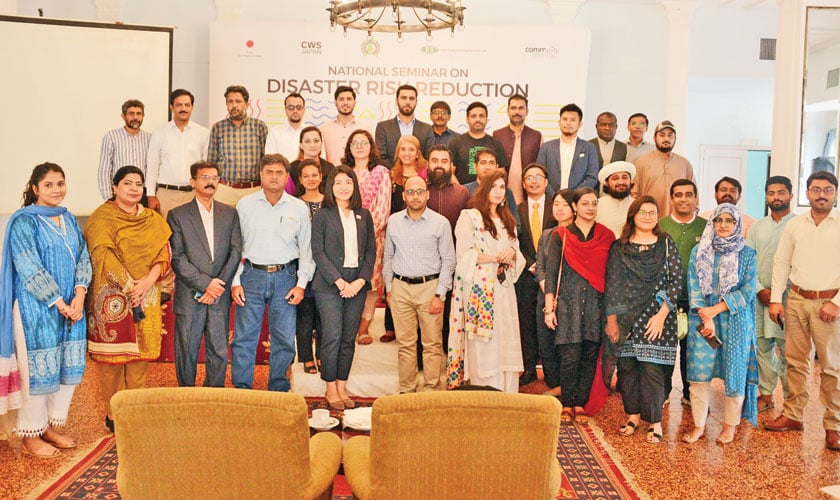
Umerkot District in focus
Water scarcity is one of the main challenges for communities in the Thar Desert, which also includes almost half of Umerkot district. Umerkot is located in the East of Sindh, about 60 km from the Indian border. Umerkot district has two distinct geographical portions: i.e. the irrigated area in the north and west and the desert in the south and east. One can see the sand dunes spreading towards east with thorny bushes. Towards west are the alluvial planes with vast stretches of vegetation. There is no river or natural stream in the district.
Water scarcity is a common problem in most villages of Umerkot. Rural women carrying matkas on their heads and young boys riding donkey carts to fetch water long distances away are an everyday sight here. The main sources of income of people of Umerkot are agriculture and livestock, which are totally dependent on the availability of water.
There are two types of water available in the area. The first source of water is the tubewell but it is bitter in taste and is undrinkable. The second type is the locally constructed wells that yield sweet and drinkable water, but the yielding process is very slow. The water from this point of source is collected on a first come first serve basis. The person who gets to the well first has the right to get water as much as he desires meanwhile the other has to wait long hours for their turn. Many of these wells are at a long distance from homes in most Umerkot villages and fetching water is often left up to the women or children of the house. This means long walks and waiting under the scorching sun for women, young girls and boys. And with long droughts on top, it becomes challenging for the people of Umerkot to survive.
Community World Service Asia, a humanitarian and development organisation, during its field operations observed significant negative impact on the lives and well-being of local communities due to chronic water shortage and drought. There was a need for enhanced disaster resilience among affected communities to ensure their access to water and build capacities on drought resilient agricultural practices.
Keeping that target in mind, Community World Service Asia (CWSA) with the support of the Ministry of Foreign Affairs Japan and the technical assistance of CWS Japan and Japan Conservation Engineers Co. Ltd., in collaboration with the Department of Rural Sociology Sindh Agriculture University of Tando Jam, implemented a drought risk mitigation initiative in Umerkot. The project, lasting from January 2019 to August 2022, aimed at enhancing disaster resilience of underprivileged local communities living in remote and hazard prone villages in Umerkot District, against droughts through improving their access to water and introducing new and sustainable agricultural practices.
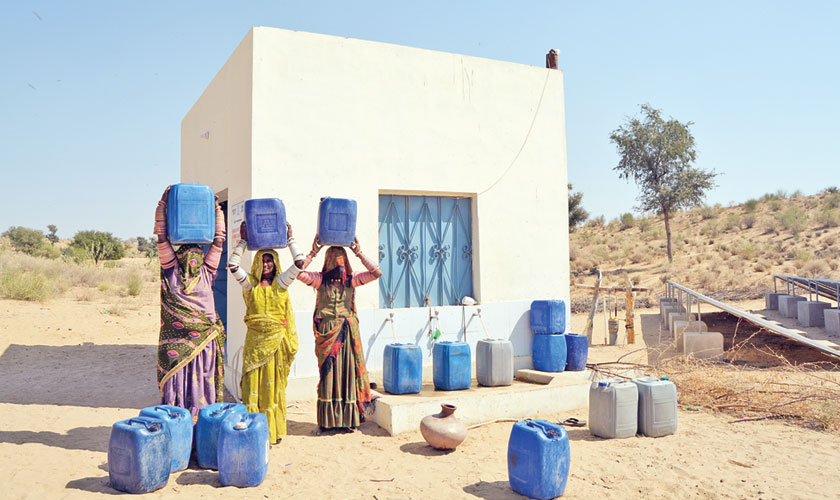
Changing lives
Dai lives in Nau Subhani, one of the villages of Umerkot. Until 2019 when CWSA field workers visited it, the village had remained neglected. Other than a few underground rainwater harvesting tanks built several years ago, it had nothing to show in terms of modernity.
Though uneducated, Dai is a member of the Village Committee. She is vocal about community water woes. She told that their source of potable water was the army’s Water Point 3, about eight kilometres away by the roadside. This water carried tiny squiggly critters and it had to be put in either a plastic bottle or a cooking utensil and left in the hot sun for the worms to be killed. Yet, the water gave them gastric problems. The other source of potable water was the water tanker the community purchased from Umerkot. At Rs 7000 per tanker, this was no mean investment that lasted about twenty days in the crumbling underground tanks. Groups of three to four households would pool in the money. It is hard to imagine how a community living well below the poverty line could make such recurring expenditure.
After the necessary training in, among other things, kitchen gardening in 2020, CWSA provided the village with fourteen underground concrete tanks to harvest rain water and in 2021 installed a reverse osmosis (RO) plant to deliver 5000 litres over twenty-four hours. All of a sudden, the long treks and the longer wait at WP 3 were over. “With the underground tanks filled by rain, the training on kitchen gardening came in very handy,” expressed Dai. She was happy to harvest her first crop and her family dined on the best vegetables in a very long time. With the first vegetable harvest over with, she is preparing to plant the next batch of spinach, rapeseed and marrow. Thinking ahead, she is saving seeds from harvest to use again.
The story of Shaibaan is one of courage and determination. Living with her seven children in the remote village of Ratan Bheel in Umerkot district, Shaibaan is constantly multi-tasking to meet the needs of her family. Selected alongside thirty other women from Ratan Bheel and nearby villages, Shaibaan was trained on kitchen gardening techniques in March 2019. The group of women were familiarised on the concept of kitchen gardening. They were taught different vegetable sowing and pest control techniques. Shaibaan replicated the training in fourteen other households in her village. “I did not think of growing a kitchen garden in this desert area. When Shaibaan came to my house with this initiative, I was amazed to know how we can grow clean and healthy vegetables in our yards for our daily consumption when cooking food. We now have the pleasure of eating homemade nutritious vegetables of various kinds,” elucidates Saleemat, another Ratan Bheel kitchen gardener.
Another story is of Mariam, who lives in Dediyo Mangrio, a village in Umerkot District. She is also vocal like Dai and knows how the CWSA intervention has changed lives in their village. She is happy with the fuel-efficient cooking stove introduced by the organisation. “The earlier traditional stove used up to five kilograms of fuel wood to cook one meal for the family. But with the new fuel-efficient stoves that can take two pots at a time, the same amount of cooking consumes somewhat less than half that amount of fuel,” she points out. Mariam now devotes the extra time on her needlework and is making some money from selling her colourful rallis.
Mariam and her husband Sabir got their Disaster Risk Reduction training with CWSA and are now members of the DRR committee. The training taught them the imperative of collecting and storing fodder for the lean period. They were also made aware of their right over the Livestock Department and that they could demand for their animals to be vaccinated. Countless animals have been preserved in one year since the training.
Not only that, the RO plant installed in their village, also brought a wave of prosperity. The water tanker from Umerkot cost them a hefty Rs 10,000 which lasted four to five households about a fortnight. Exempted of that expense, the community is now spending the savings on education. Mariam believes it is her children’s education that will eventually change their lives.
(The writer is indebted to Salman Rashid for sharing stories of Dai and Shaibaan.)
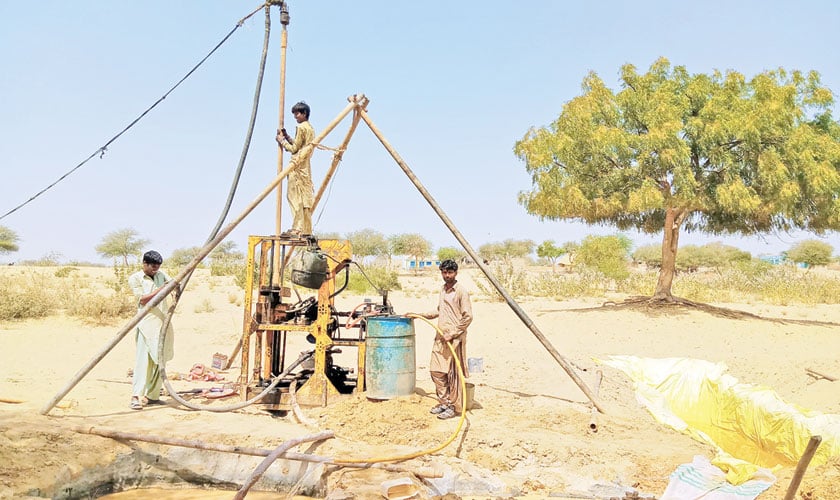
National Seminar on Disaster Risk Reduction
Recently, a National Seminar on Disaster Risk Reduction (DRR) was held in Karachi. The seminar was organised by Community World Service Asia in collaboration with the Ministry of Foreign Affairs Japan and Department of Rural Sociology Sindh Agriculture University of Tando Jam. The seminar was attended by different stakeholders and media representatives.
Its aim was to promote a global culture of raising awareness on disaster reduction, including disaster prevention, mitigation and preparedness among the Pakistani community most affected by recurrent climate induced hazards and supporting drought-resilient agricultural practices in rural communities. The event was designed to bring relevant stakeholders, including government agencies, public and private organisations, academia and the civil society together, who have worked together on mitigating drought impact in the Sindh Province and to explore collaborative efforts for more long-term resilience building.
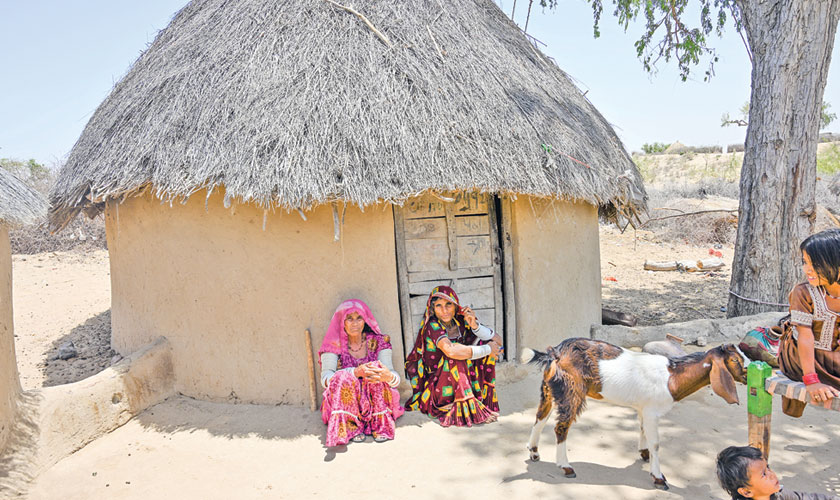
“Pakistan is one of the co-signer countries of World Trade Organization (WTO). The agreements on Agriculture in the context of free trade worldwide have increased the responsibilities of agricultural universities of the country to groom and motivate the youth specialising in different disciplines of agriculture by strengthening their efforts manifold to face the competition in agriculture trade and services worldwide,” noted Dr Muhammad Javed Sheikh, Associate Professor and Chairman, Department of Rural Sociology, Sindh Agriculture University Tando Jam, while presenting his paper.
While talking about Electrical Resistivity Survey (ERS), Nazar Gul, Deputy Director, DRIP-PCRWR, Tando Jam, explained, “In districts like Thar and UmerKot, dug well water is the oldest and primary source of water. However, water supply from these wells is insufficient to meet the demand of the growing rural population. Anyone can install any number of wells of any capacity, at any depth and can pump any amount of water at any time. Drilling of wells therefore, entirely depends on the advice of the local drillers and wishes of the farmers. This practice has led to groundwater depletion, both quantitatively and qualitatively. And these wells dry out during the drought periods. The solution of this problem is ERS, a technique that is being used now to identify the viable spots or locations of great groundwater potentials. ERS is based on application of Ohms Law and measures the average resistivity of the earth on the ground surface. This method has advantage over others in the sense that water quality can be determined along with the specific yield etc.”
While shedding light on the salient features of the project, Tassaduq Hussain, Program Coordinator, CWSA, shared, “We provided relevant water related information to the locals. We conducted comprehensive 204 Climate Resilient Agriculture Training Sessions that benefitted 3,960 men and women. We also held 299 Kitchen Gardening Sessions where locals were informed about latest techniques, benefitted 5,759 men and women. We also conducted 207 community awareness sessions on Disaster Risk Reduction (DRR) with 3,894 individuals. The locals also got to know about Water Harvesting Tanks and R.O (reverse osmosis) Plants. During the project, technology transfer workshops were also held in a bid to update locals with latest technology.”
“Now, due to CWSA’s constant efforts in the last three years, access to agricultural water and relevant farming practice/technology is improved in drought affected areas. Communities have their village plans available which they can utilise to mitigate disaster impact. They are applying the learnings in practice. Farmers are practicing the learned techniques such as seed germination tests, etc. Community members use home based vegetable and utilising saved amount to fulfil other needs,” he concluded.
Erum Noor Muzaffar is the editor of You! magazine. She can be reached at iram29@hotmail.com
SITUATION ALERT
More than a thousand people have died and millions have lost their homes across Pakistan as torrential rains hit the country. Widespread rain and thunder storms have also struck districts Mirpurkhas and Umerkot of Sindh province, where a majority of Community World Service Asia’s humanitarian and development programmes are focused. These extreme rains are critically affecting vulnerable communities already living in poverty and has damaged infrastructure in the area, with no electricity and limited communication access.
People in Umerkot have been forced to abandon their homes as crops and livestock are washed away across the province. The flood-affected communities in Umerkot are in need of food, tents, clean drinking water, mosquito nets, ration bags and hygiene kits. Hundreds of miles of roads have been damaged, making many areas in Umerkot inaccessible to emergency services.
“Pakistan is in the middle of the food, climate, water, population and environmental crisis. Pakistan has faced 152 extreme events in the last two decades with constant shifts in rainfall patterns, intensity and frequency. We are also home to the hottest cities in the world for three years straight with temperatures rising up to 53.7C which is an unlivable situation,” said Sherry Rehman, Climate Change Minister of Pakistan.
Community World Service Asia is in coordination with the local government and other stakeholders and is closely monitoring the situation on the ground to start immediate relief operations.
Situation Update II Millions affected as the decade’s worst disaster hits Pakistan
The monsoon flooding in Pakistan continues to wreak havoc as 119 people have reportedly died in the last 24 hours, according to figures released by the National Disaster Management Authority (NDMA), taking the total death toll from this natural calamity to 1,200. This year’s floods are being compared to that of 2010 – the worst on record– when more than 2,000 people died and nearly a fifth of the country was under water.
Thirty million people (about 15% of Pakistan’s total population) have been affected by the floods across the country so far, with ten million people left homeless, 800,000 livestock perished, one million houses completely washed away, over 200 bridges and roads collapsed and more than forty small dams breached since June 14th this year1. UNCOHA reports a total of 116 districts affected, including 66 districts officially declared ‘calamity hit’.
In Sindh province alone, the floods have killed more than 300 people. Along the narrow streets, people use whatever patch of dry ground is still available to pitch temporary shelter. In addition, almost 710,000 livestock are lost, and thousands of kilometres of roads and bridges destroyed. The floods have caused an earthquake-like destruction. Local communities in Sindh claim these rains as different – more intense than anything they have ever seen. One local official called them “floods of biblical proportions”2.
Mirpurkhas and Umerkot districts of Sindh were already severely affected by floods during the 2020 monsoons, which left agrarian communities at a huge loss of standing crops and agricultural property. People here had hardly started recovering from the shock of losing two cropping seasons, when their crops this year have again been completely destroyed. These communities are left with no option but to depend on humanitarian support for recovery and rehabilitation.
| Impact of 2022 Floods in CWSA’s Project Area | |||||
| District | Partially Damaged Houses | Completely Damaged Houses | No. of Affected Union Councils | Acres of Land Impacted | Affected Population |
| Mirpurkhas | 82,295 | 23,587 | 50 | 169,353 | 261,781 |
| Umerkot | 60,110 | 190 | 42 | 88,885 | 557,280 |
People from nearby districts such as Sanghar and Khairpur have also taken refuge in elevated areas in district Umerkot in addition to the district’s own population living on irrigated patches. Affected communities from other districts are included in the number of displaced people recorded in Umerkot currently.
The rainfall received nationwide is 2.87 times higher than the national 30-year average, with some provinces receiving more than five times as much rainfall as their 30-year average. The climate minister, Sherry Rehman, said the country was going through its eighth monsoon cycle “while normally the country only has three to four cycles of rain”.
Millions are without food and shelter in Balochistan, Khyber Pakhtunkhwa and Sindh provinces, which have been most affected by this “climate change catastrophe”. People have lost their homes, their cattle, their lands and livelihoods and are now totally dependent on humanitarian assistance. Affected communities are in immediate need of clean drinking water, food, emergency medical assistance, and shelter. The poorest and most vulnerable are on the frontline of this crisis.
Pakistan is eighth on NGO Germanwatch’s global climate risk index, a list of countries deemed most vulnerable to extreme weather caused by climate change.
We need your generous support to help flood-affected families and support them to rebuild their lives.
Community World Service Asia Response:
Community World Service Asia (CWSA) is in coordination with the local government and other stakeholders active in the area. Our emergency response team is closely monitoring the situation on the ground, is undertaking assessments and mobilising funds, preparing to start relief operations as soon as possible.
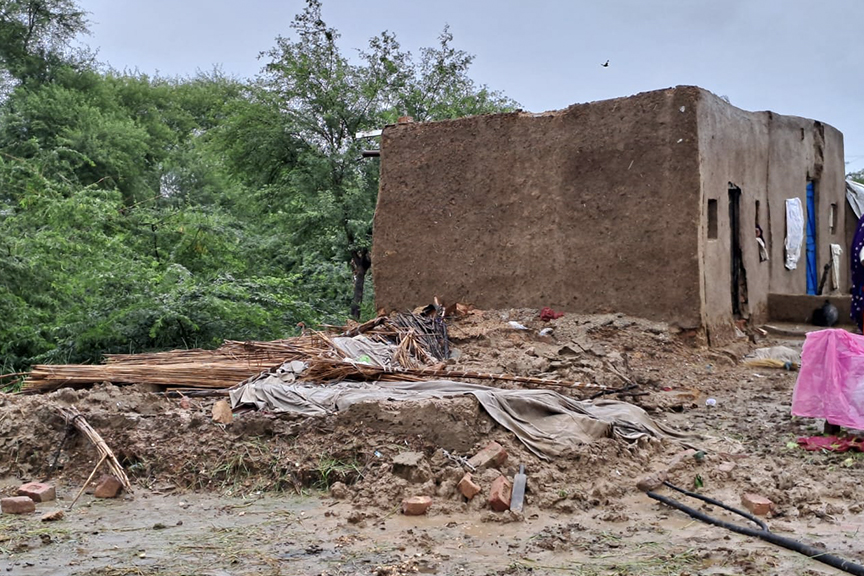
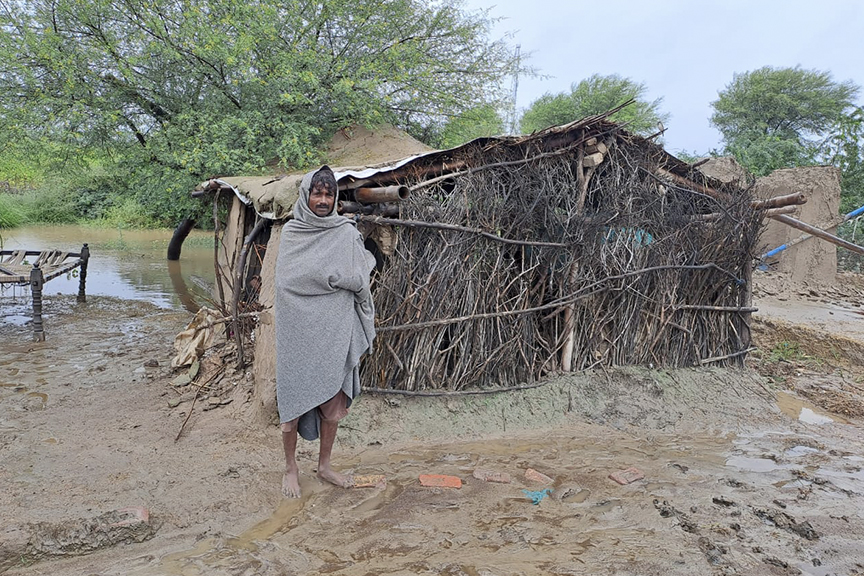
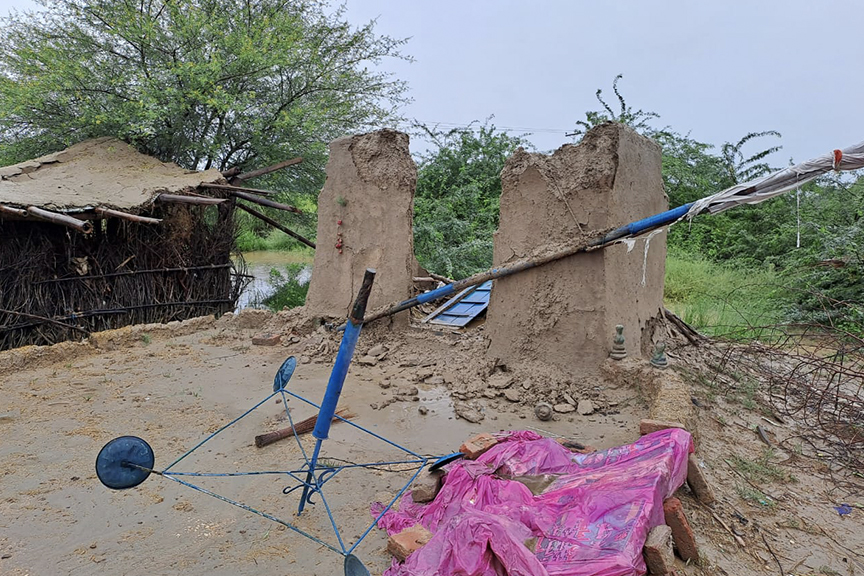
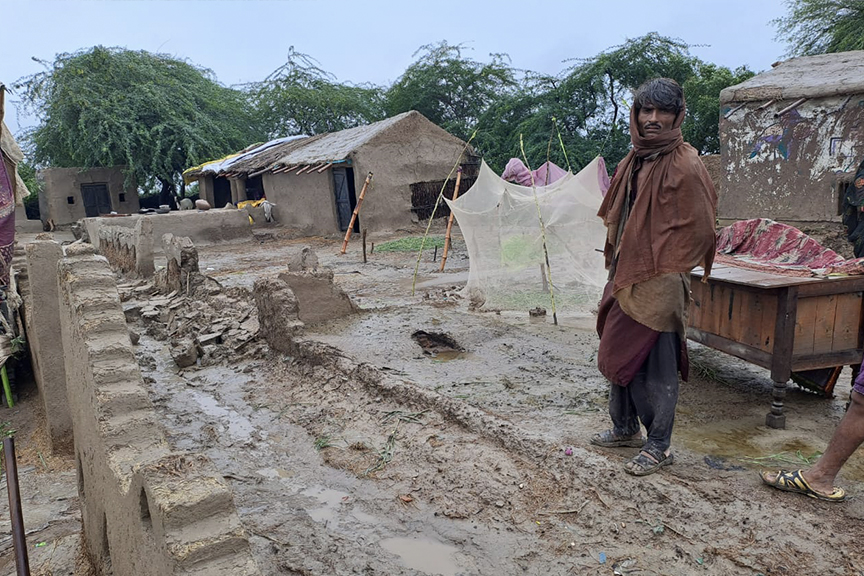
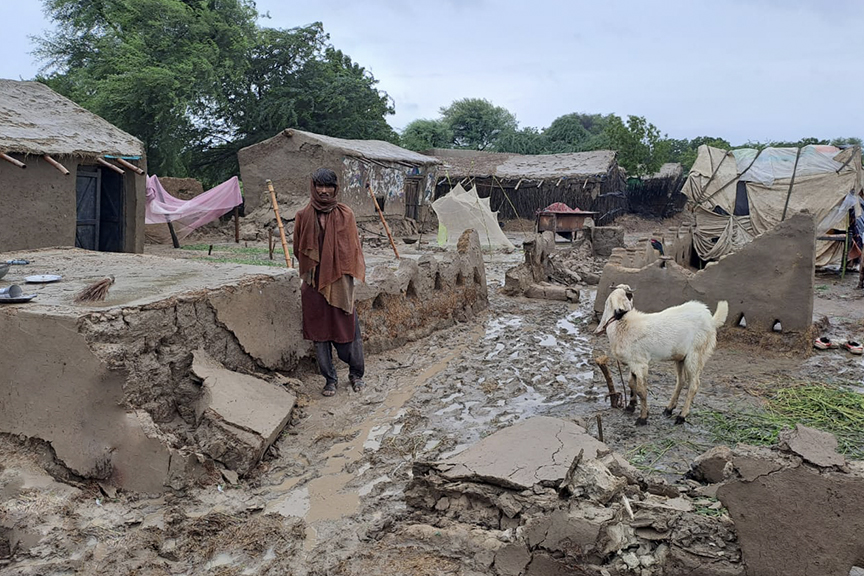
Contacts:
Shama Mall
Deputy Regional Director
Programs & Organizational Development
Email: shama.mall@communityworldservice.asia
Tele: +92 21 34390541-4
Palwashay Arbab
Head of Communication
Email: palwashay.arbab@communityworldservice.asia
Tele: +92 21 34390541-4
Sources:
NDMA Report
UNOCHA Report
www.dailytimes.com.pk
www.ifrg.org
www.tribune.com.pk
www.guardian.com
- NDMA report Aug 29th
- Bbc news -Aug 29th.





